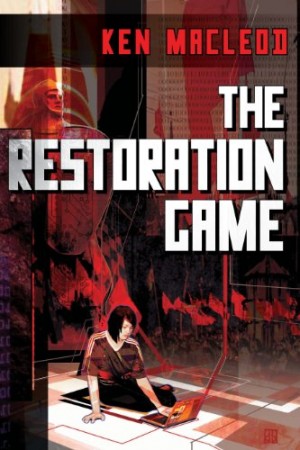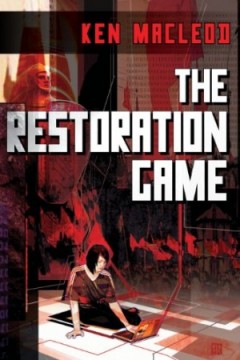
Having never read a Ken MacLeod novel before, I found my introduction to him to be a bit rocky. The opening chapters of The Restoration Game were replete with irritants. After that it settled down and started to tell an interesting story, but never quite managed to completely convince. It had the right ingredients for a better tale, but it could not get the doses right and wound up feeling, for all its positive points, out of balance.
The story’s protagonist, Lucy Stone, spent most of her childhood in the fictional Soviet Republic of Krassnia, but now works for a computer game company in Edinburgh. Her company is hired to make a Krassnian version of a popular medieval computer game, and her heritage and lingual abilities, rare to be found in the West, are the reason her company was chosen. There is more to this request for a Krassnian video game than is initially apparent, however. Lucy’s mother is a former CIA operative, and another man who might be her father is mired in the same kind of political intrigue. Through them Lucy gets entangled in an international plot the details of which are murky but the danger in which becomes increasingly apparent. Finally, she finds herself on a mission with consequences so far reaching that “epic” does not seem to do them justice.
The novel opens with a prologue written in second person, which constitutes the first irritant. I do not see the point of second person, unless it is to make the author seem a little overbearing, informing a reader what he is doing instead of telling him about a story. To me, it seems like a cheap way to “be different.” It is fortunate that there are only three second person chapters in the book, all with a commonality that one supposes the shared difference in perspective is meant to highlight.
It is unfortunate that the second chapter is a flash forward to near the end of the book. In it, the narrator is clearly on the verge of a very traumatic experience, but its effect is attenuated by the fact that we do not know what the problem is, or The Other Thing that she refers to, and we cannot much care about her since we have not gotten to know her yet. Any effect of the mysteriousness of this Other Thing evaporates when we realize it is a flash forward, and must make another jarring jump before the story can get started.
Finally, three chapters in, we are introduced to a protagonist at the beginning of a story and start to get to know her. Her narration style reminds one of a fourteen-year-old girl on the phone with a fellow teenybopper. Soon after, she jumps into backstory. So the initial chapters of the book consist of odd bits of second person narrative, an annoying narrator with a less than propitious voice for this sort of story, and leaps from one time frame to another that are apt to give the reader whiplash. We get a perspective of someone, us apparently, outside our universe, then a future time frame, then a present time frame, then a past time frame.
This is the sort of thing that makes me regret opening a book in the first place, but there were two redeeming qualities about the beginning, qualities that gave me hope that the book would get better (the narrator’s voice also got less irritating, or perhaps I just accustomed myself to it). The first was a bit of cleverness after the prologue, the kind you do not get from writers of no talent.
I stopped dead. My rolling case, in accordance with Newton’s first law of motion, kept rolling and collided painfully with my calf muscles. It then rebounded (third law), toppled over (second law), and made me stumble (Murphy’s law).
The second was a small section in the prologue that hints at a profound and very arresting idea:
“… you have brought those poor creatures to the brink of disaster. Nuclear war, ecological catastrophe, and what else? Oh yes — cultural calamity, as they discover they are in a simulation. How long will it take for that to dawn on them?”
“Blame the SPs for that,” says Andrea Memmius. “They used an off-the-shelf navigational package as the basis for their extrasolar astronomy simulation. Naturally it is Ptolemaic. They were not to know—”
“That their virtual creations would one day send probes to the edge of the solar system? That they might just notice that the galaxies are spinning too fast? That the underlying physics of their world are inconsistent?”
“So far,” says Caro Odom, “the sim-people have shown remarkable creativity in rationalizing these… dark matters!”
We are given to understand, then, that our universe is a simulation. It is also what I interpret as a dig at modern conventional physics, and one that maybe they have coming (for those interested in these sorts of things, there is, on page 233, a clear reference to MOND). However, it comes as a disappointment to discover, by degrees, that the story is too small for a concept like that. It has too little time to apportion to it, given the other tasks it sets for itself.
MAJOR SPOILER MAJOR SPOILER
This conceit of a simulated universe is forgotten until the end of the novel. When Lucy finally, at the end of her mission, finds evidence of it, it feels tacked on, a foreign element in a story that is not intrinsically about it. The idea is not, insofar as I can tell, hinted at, talked about, or developed in any way after its introduction in the prologue. Then it resurfaces in the final act.
Perhaps The Restoration Game could be improved by omitting the prologue, by introducing a mystery whose elements baffle investigators through the course of the book until the final answer is hinted at in the end, when Lucy discovers a great secret. That way, it would have been a part of the story the whole time, but subtle enough not to give the game away, rather than an addition on the front and back of a story otherwise unconcerned about the topic. And better yet, it might have been left tantalizingly inconclusive rather than definite.
END OF SPOILER END OF SPOILER
Lucy’s family history is delved into several times, either by her telling us what she knows, or reading an old diary and relating it to us, or hearing stories from others who were there. The backstory itself is intriguing, but the time devoted to it is out of proportion to the other elements of the novel. By the time it is finally told, with the exception of an important reveal at the end, we are over halfway through the book. Meanwhile, very little is advanced or developed in the current timeline. Lucy meets a guy, they fall in love, she works on her video game project.

The current timeline is mostly to put her in situations so that the reader can read more of the backstory. Then, with the majority of the book’s pages used up, the current timeline suddenly kicks into gear and Lucy goes on a very rushed mission that runs her smack dab into, as I have said, a gigantic idea that towers over the small novel like a colossus.
Complaints aside, I did enjoy the book. The backstory is too much, but it is interesting. Several generations of Lucy’s family are explored and they have some remarkable history. I also felt the author did a crafty job of mixing the events of his story with the turmoil in Ossetia and Georgia that happened in real life. Apparently, these unforeseen events, occurring while he was writing the book, forced him to make some last minute changes. This he pulls off marvelously.
The one thing I cannot figure — not about the book per se, but rather about reaction to it — is why this would get a Prometheus Award nomination. I do not see anything particularly libertarian about it. It explores some of the nastier aspects of communism, but even socialists are given to do that once in a while. Indeed, in seeing the sensitivity to nuance with which the author paints the different brands of communists, one might suspect him of being, if not in the fold, some sort of ideological cousin. Certainly he has gotten to know the movement.
It also does not paint the CIA in a wonderful light, but a book cannot be called libertarian simply because it opposes some of the same things a libertarian does. There are no libertarian characters; the sympathetic ones are just about uniformly social democrats. This might be realistic for a novel principally set, in one timeline at least, in modern-day Edinburgh, but it is hardly libertarian. Nor is there any attempt, so far as I can discern, to make an understated libertarian point about the things going on in the book.
I suppose that is not my concern. The Prometheus Awards may nominate whom they wish, and one imagines there is a paucity of truly libertarian material out there. What does concern me is whether or not I like the book, and I did. Sort of.
















Comments on this entry are closed.
Roderick T. Long January 30, 2013 @ 2:58 pm | Link
I’ve noticed that Prometheus Awards often go to books whose authors have written other books with libertarian content.
Matthew Alexander January 30, 2013 @ 5:24 pm | Link
Maybe that is what was going on here. Geoffrey and I have come to the conclusion that there is a bit of desperation in finding enough novels to fill up the lists of finalists, so many excuses are used.
Thanks for stopping by!